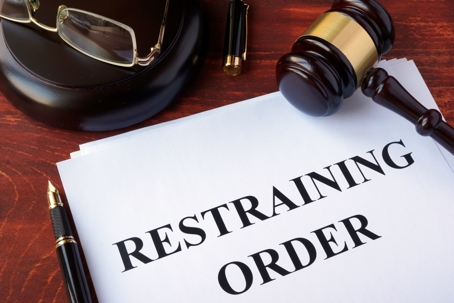In North Carolina, there are two types of restraining orders: domestic violence protective orders and civil no-contact orders. In the court system, a domestic violence protective order is often called a 50B, while a civil no-contact order is referred to as a 50C.
Domestic Violence Protective Orders vs. Civil No-Contact Orders
There are two main differences between a 50B and a 50C. First is how each violation is punished. If someone violates a 50C, the victim may file a show-cause order and ask the judge to hold the defendant in contempt. Punishment for contempt of court includes, but is not limited to, jail time, required treatment, and financial costs. On the other hand, if someone violates a 50B, the violation can be reported to the police and a person can be arrested for the alleged violation as this violation is considered a criminal offense.
The second main difference between the two types of restraining orders is who may apply for each. North Carolina law mandates that if you have one of the following relationships with the defendant, you must file a 50B:
- Are current or former spouses;
- Are persons of opposite sex who live together or have lived together;
- Are related as parents and children, including others acting in loco parentis to a minor child, or as grandparents and grandchildren. For purposes of this subdivision, an aggrieved party may not obtain an order of protection against a child or grandchild under the age of 16;
- Have a child in common;
- Are current or former household members; or
- Are persons of the opposite sex who are in a dating relationship or have been in a dating relationship. For purposes of this subdivision, a dating relationship is one wherein the parties are romantically involved over time and on a continuous basis during the course of the relationship. A casual acquaintance or ordinary fraternization between persons in a business or social context is not a dating relationship.
In the alternative, if you do not fall into one of these six categories, you must file a 50C.
Restraining Order Hearings in North Carolina
The process to get either of these restraining orders is very similar; both begin with drafting a complaint. This complaint is very important, and if at all possible, should be drafted with an attorney. The complaint sets forth the grounds for which the petitioner, or victim, is asking the court for the protection of either a 50B or 50C. It is very important that the complaint set forth adequate facts and reasons, because when the court holds a hearing on the matter, the petitioner is limited to only those violations alleged in the complaint.
The next step in the process is also identical for both a 50B and a 50C. This step is for the court to hold an ex-parte hearing to determine whether a temporary order should be granted. Ex-parte means that the court will hold the hearing without the defendant being present to defend him or herself. Due to this hearing being held without the presence of a defendant, these temporary orders can last no longer than 10 days without the consent of both parties.
Finally, there is a full hearing in which a judge will listen to evidence presented by both sides and make a decision on whether they should grant the fuller, longer-lasting protection of a full 50B or 50C. During this full hearing, both parties are allowed to be represented by an attorney, call witnesses, and make arguments. Once the hearing is completed, the judge will make a ruling. It is important to know that if you decide not to get an attorney to represent you, the judge is required by law to treat you the same and hold you to the same standards that they would an attorney.
Need Help Fighting or Seeking a Restraining Order?
If you have been charged with domestic violence or someone has filed a 50B or 50C against you, you should contact an attorney immediately. If granted, a 50B could remove you from your home, determine temporary child custody, or even determine the control of certain shared assets. If a 50C is granted against you, it could limit public places you could frequent, and could have lasting effects on your job and housing. If you had a restraining order filed against you and you were found in violation of it, you could be jailed and charged with an additional crime, such as aggravated stalking.
Restraining orders can do many things, including the following, and more:
- Prevent the offender from purchasing a gun
- Order child support and/or spousal support
- Order the offender to not harass, follow, abuse, or threaten the alleged victim
If you would like to seek a restraining order, or one has been filed against you, or if you have questions about restraining orders in North Carolina, contact us today to see how you can ensure your rights and future are defended. We have experienced attorneys who practice in the field of criminal law and have helped thousands of clients with their criminal law needs. It is now more important than ever to consult an attorney to make sure your rights are protected.

